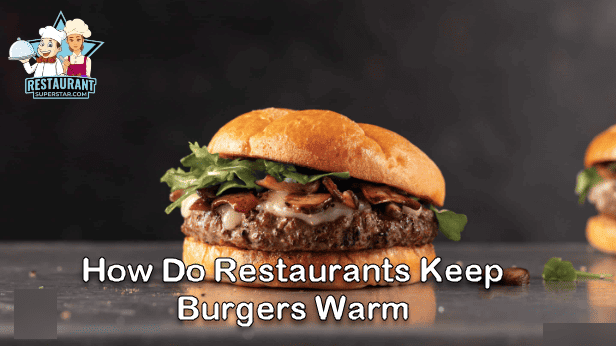What Oils Do Restaurants Use? (A 2024 Chef’s Update)
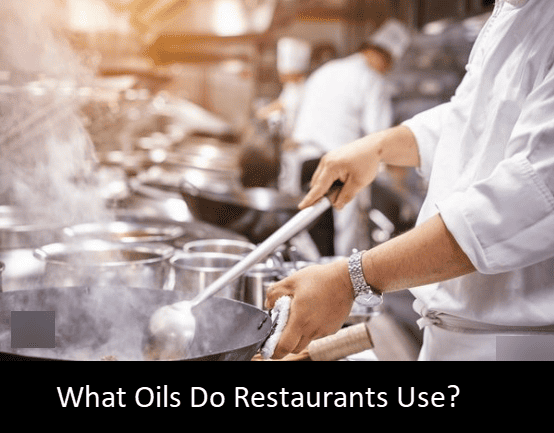
If you want to know “What Oils Do Restaurants Use?” you’re in the right place. We’ll go into great detail on this question and other related questions. If you find this article helpful, please share it with others who might be interested.
What Oils Do Restaurants Use? Most restaurants will use canola oil, peanut oil, and other blended seed oils for frying. They will use animal fats like lard, ghee, butter, and tallow for cooking.

What are Frying Oils Used by Restaurants
The type of frying oil you use will affect the quality and flavor of your food.
Here are some popular oils used by restaurants.
1 – Canola Oil
Rapeseed is the plant through which canola oil is produced. This clear oil is treasured for its capacity to bring out the flavor of the food despite having a neutral taste and aroma with a delicate appearance.
Refinement of most canola oils for deep frying increases stability and shelf life. Whether or not the oil may be used for this purpose is indicated by its smoke point.
Because most deep fryers can only reach temps of 350 to 400 degrees F, canola oil is a great substitute. Canola oil’s low price makes it a good choice for restaurants that often run out of cooking oil.
2 – Peanut Oil
The smoked point of peanut oil is 450 degrees Fahrenheit, roughly 50 degrees higher than the smoking point of canola oil. Despite having a slightly greater cost than canola oil, peanut oil has a higher smoking point.
This increases the stability of peanut oil, which is beneficial when utilized in fryers that frequently run at temperatures around 400 degrees.
Besides that, numerous restaurants avoid using peanut oil because it may cause clients with peanut allergies to harm their bodies. It would help if you didn’t bother about this, though, as long as you spend money on specially formulated peanut oil.
Allergies to peanuts are caused by an individual protein found in the nuts. Deep-fried peanut oil is refined to remove this complex protein but remains in frozen, expelled, and extruded peanut oils.
3 – Blended Oil
Most deep-frying oils are carefully formulated combinations of various oil types. That enables producers to leverage the advantages linked to specific kinds of fat.
For example, a 50/50 peanut and soybean oil mixture can reach a smoke point comparable to pure peanut oil. In the meantime, soybean oil aids in bringing down the price of the oil, making it a more affordable option.
Canola and soybean oils make up a whole other familiar mix of oil. The smoke point of this mix can reach 450 degrees Fahrenheit.
Additionally, a soy-canola oil mixture reduces the rate of taste transmission between the meal and the oil. Additionally, this blend has no trans fats, making it a healthier option.
What Oil Do Most Fast Food Restaurants Use?
Soybean oil is the most prevalent of the three vegetable oils that the fast-food businesses have converted to.
It is a suitable soybean product, mainly used to make meals and oil, and oil makes up one-third of its worth.
The lack of goods that contend with fast-food restaurants for the maize oil market is expected to be filled by soybean oil. The items with the description “mainly corn oil” are exceptional cases.
According to ERS, the price should increase by less than half-cent per pound because the 50 million pounds more fast food outlets will be using will only represent a small portion of all current users.
What Oil Do Chefs Use?
The standard oils chefs use are cotton seed for frying, any vegetable oil for general use, extra virgin olive oil for salads, and drizzled around the plate to conclude an entrée or a main meal. Some restaurants also use olive oil for light cooking.
Some others use corn oil due to its 450° smoke point. Refined corn oil is frequently used for frying due to its inexpensive cost and bland flavor, and it is widely used in professional kitchens.
What Do Restaurants Do with Frying Oil?
Most restaurants have been collecting bins for their fryer grease, often kept in the back of the facility adjacent to their garbage cans.
Most restaurants regularly receive free grease collection, and many also get rebate checks in the mail for the grease they recycle.
Quick-serve menu items items like French fries. Research teams are researching whether this used oil contributes to the spread of metastatic breast cancer.
What types of oil are not Recommended for Deep Frying?
Avoiding oils such as corn and sunflower for deep frying is recommended as they are unsuitable for high-temperature cooking.
Moreover, to minimize the risk of heart disease, it is advised to avoid deep-fried foods, often high in saturated fats and salt.
Do Restaurants fry everything in the same oil?
Many fast-food chains use the same oil to fry various items, including chicken and French fries. However, the practice can vary depending on the restaurant’s fryer type and cooking procedures.
Do Restaurants use peanut oil for Frying?
Many restaurants favor peanut oil for frying because it creates crispy, tasty dishes. However, it can pose an issue for individuals with peanut allergies, as they might be sensitive or allergic to this type of oil.
What Oil Is Best for Restaurant Cooking?
The best oil for restaurant cooking is olive oil. A lower risk of developing chronic diseases has been related to the Mediterranean diet.
In addition to being rich in potent antioxidants like fat-soluble vitamin E, which supports the health of your skin, hair, and nails, olive oil, which is famous for its use in the Mediterranean diet, is also rich in beneficial monounsaturated fatty acids.
Additionally, olive oil is frequently regarded as the healthiest cooking oil due to its many health advantages, including its ability to prolong life and prevent or manage diabetes and several malignancies.
People live longer in areas where olive oil is a common ingredient. With more than half a tablespoon of olive oil daily, users had a lesser mortality rate than those who didn’t.
What Oil Do Professional Chefs Use?
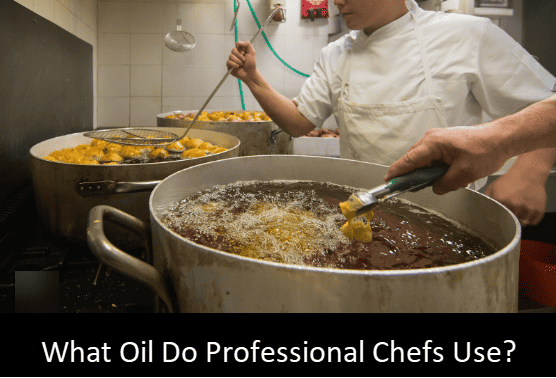
Professional chefs make use of peanut oil. Peanut oil is a high-heat cooking oil produced from the seeds of the peanut plant. Its affordable price and bland flavor make it a flexible choice for many restaurant meals.
Low-temperature drying of the peanuts is followed by oil extraction to create these unprocessed choices, which help preserve most of the peanuts’ natural nutrients.
The strong, nutty taste and fragrance of chilly or unrefined peanut oil make it a great addition to salad dressings and spreads.
What Oil Do Restaurants Use for Steak?
Your technique determines the most refined oil for cooking steak, but you should look for a pure oil (without any additives) and one with a high enough smoke point.
The best alternatives are canola, grapeseed, olive, and peanut oil. Oil adds flavor and achieves the ideal crispness when cooking a steak. Additionally, you want a cooking oil that won’t produce a lot of smoke!
Oils with low smoke points, such as regular vegetable oil, extra-virgin olive oil, and olive oil, should be avoided.
They typically range from 300 to 350 F, which is simply insufficient for steak and might quickly result in issues with burned oil that would negatively impact your flavor.
What Oil Does KFC Use?
Fully processed soybean oil, used in preparing most KFC fare, is not considered an allergen by the Food and Drug Administration.
Researchers have shown that certain people who are normally allergic to soybeans may not have an adverse response to soybean oil. People with soy allergies must know that some KFC menu items contain soy.
Please avoid the Kentucky barbecued and fried wings since they were created using soybean ingredients.
Chicken pot pie, famous bowls, and popcorn nuggets are off-limits to anyone with a soybean allergy. Crispy Chicken comes in three varieties: Traditional Recipe, Extra Crispy, and Spicy Crispy.
What Oil Are Mcdonald’s Fries Fried in?
McDonald’s fries are cooked in vegetable oil, like most fried items. The oil is infused with chemical flavor to match the company’s original oil blend, primarily beef tallow. They also use an oil mixture with a beef taste when partially frying the chopped potatoes.
What Oil Does Burger King Fry in?
Although Burger King is known for its flame-broiled burgers, most other poultry products, including French fries, are cooked in cooking oil.
Each round is prepared from scratch with vegetable oil via specialized fryers so that you may indulge guilt-free.
Sadly, and in a very disappointing twist, even though all of the components in their Unbelievable whoppers are vegan, the way they prepare them destroys all that complicated research and effort.
They use the same grills, and the fine print on their website clearly states a statement of explanation.
Although Burger King doesn’t precisely list all the ingredients for its menu items, it offers an Allergen Guidance on its often updated website.
What Oil Do Restaurants Use for Deep Frying?
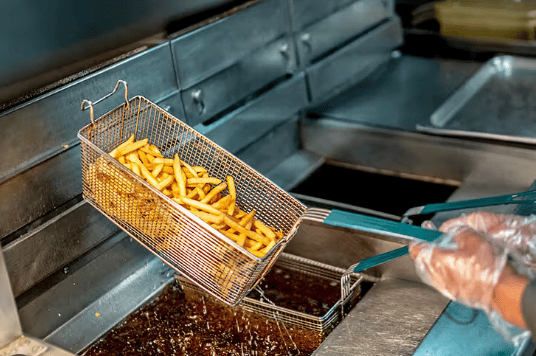
Canola oil is a solid option because most deep fryers operate between 350 and 400 degrees Fahrenheit.
Additionally, canola oil is sometimes among the most inexpensive oils on the market, making it a well-liked option for restaurants that need to use significant amounts of oil and change their oil frequently.
Since it contains only 7% saturated fat, canola oil is a heart-healthy option. In a real sense, the American Heart Association is one of the influential health groups that support the usage of canola oil.
Because it is a great substitute for vegetable oil and is made from rapeseed, which has a high smoke point and can be utilized in various ways in restaurants, canola oil is a widely used cooking oil.
What Oil Does Wendy’s Use?
Generally, Wendy’s fries are fried in soybean oil, while its chicken tenders and nuggets are fried in maize oil. However, its chicken tenders and nuggets are fried in soybean and corn oil.
As a result, Wendy’s can continue to dish up its delicious, crispy fried items without worrying about allergies.
This also lessens the possibility of cross-contamination in the kitchen, a constant worry.
Additionally, food at Wendy’s is safer and more environmentally friendly since they utilize responsibly sourced and allergy-friendly oils.
It comprises oils from sustainably harvested sources like palm, corn, and soybean. All these oils are flavorless and light choices that are excellent for frying and cooking.
This keeps Wendy’s from utilizing heavy or inferior oils to make its famous fried meals.
These alternatives are considerably safer than peanut oil, which has historically been the most used frying oil in restaurants.
Since peanut oil is hazardous to people with nut allergies, most fast-food restaurants are now exploring other options.
What Oil Does Chick Fil Use?
Each piece of pressure-cooked chicken sold by Chick-fil-A has been cooked in peanut oil.
According to Worrell, Truett Cathy, the founder of Chick-fil-A, has been stuck by this secret ingredient since he made his famous Chick-fil-A Chicken Sandwich.
Many fear that persons with peanut allergies may be at risk from the oil. Since peanut proteins and other contaminants are removed during refining, the FDA has decided against labeling highly refined peanut oil as an allergy.
What Oil Do Restaurants Use on a Griddle?
The preferred oil for griddle cooking is vegetable oil. It is ideal for high-temperature cooking due to its high smoke point and generally neutral flavor. 400–450°F is the smoke point.
Canola oil is also among the best cooking oils for griddle use. Although it has a high smoke point of – 400°F Smoke Point, it doesn’t significantly alter the flavor of the food. You can also use olive, sunflower seed, avocado, sesame, and flaxseed oils on a griddle.
Do All Restaurants Use Canola Oil?
For frying food, almost all restaurants utilize soy, canola, or other seed oil mystery blends as the standard. Livestock fats like lard, ghee, butter, and tallow are superior for cooking food and are reasonably priced.
Since canola oil undergoes numerous manufacturing steps and is usually refined, much of its essential nutrients are lost.
Vitamin E, which supports immune function and fosters eye health, contains 16% DV (daily value) in one tablespoon of canola oil.
The truth is that canola oil frequently undergoes extensive processing, so finding a cold-pressed, high-quality brand is essential to enjoy its health benefits.
Given the conflicting results, more study is required to determine the health advantages of canola oil.
What is used to cook the fries at Burger King?
Burger King claims their French fries are produced in trans-fat-free vegetable oil and created without animal products.
The new $1 “value” portions of Burger King’s fries will be given away for free on December 16. The revamped French fries will hit international shelves in 2012.
Does Burger King Use Peanut Oil?
Burger King asserts that their fries have no animal products or peanut oil because they are produced using trans-fat-free vegetable oil.
American-based Burger King is a global chain of hamburger fast-food restaurants. Corn, canola, soy, and cottonseed are in their fryer oil.
Most restaurants no longer use peanut oil for food since more people are developing peanut allergies. Still used often in sweets, peanut or tree nut products are used in many restaurants, including Burger King.
Why Do Restaurants Add So Much Oil?
They frequently cover meat just before placing it on heating elements. The bread in hot sandwiches typically undergoes the same procedure. They use a lot of these oils, to put it simply.
It can also be said that this fact is not based on rocket science, as a universal truth of food preparation is that a bit of generosity enhances flavor, whether in sugar, salt, ghee, butter, or oils.
In all, abundance does not imply being excessively unreasonable; it does, however, mean more and more.
What Oil Does in and out Use for French Fries?
The best, freshest potatoes make the french fries at In-N-Out. Straight from the farm, they are sent, individually cut in the stores, and fried in only 100% sunflower oil.
Why Do Restaurants Use Vegetable Oil?
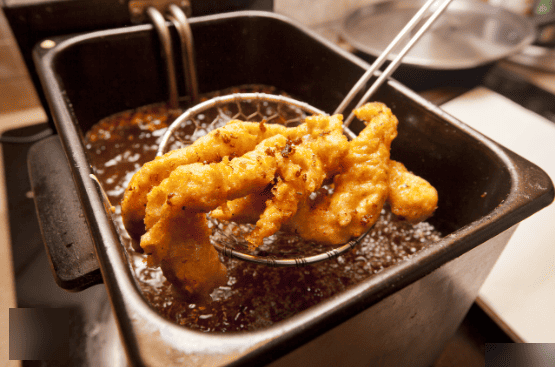
All of their sauces contain these restaurant oils. They employ them in their salad dressings.
They use them on their grills, sauté pans, and sandwich presses to prevent food from sticking. They commonly cover meats before they are placed on heating equipment.
What Are Burger King Fried Made of?
The Burger King fries are made up of –
- Peanut Oil
- Canola
- Oil Extracted from Palm Fruits
- The refined Starch from Potatoes
- Potatoes
- Starch Extract from Rice
- Dextrin extracted from Potatoes
- Salt
- Sugar (dextrose), gum (xanthan), and sodium acid phosphonates (used to preserve color) are included in the list of substances.
To top it all off, the batter is made from potatoes and spread to the freshly cut potatoes just before they are frozen. The fried coating is hot to the touch. Burger King’s fries are fried potatoes similar to potato cakes and tempura.
Conclusion – What Oils Do Restaurants Use?
The cooking oil at your favorite restaurant isn’t a problem except if you have a food allergy.
However, we have read and understood how different kinds of oils work. The oils of most of our popular eateries have also been revealed in this article. All oils have ups and downs; you use what works best.
Jeff Smith is a Restaurant Consultant with over 20 years of hospitality experience ranging from server to owner and general manager. He focuses on Restaurant POS technology as well as restaurant marketing. Make sure to check out our world famous restaurant resources resources page for a comprehensive offering of hand picked resources and tools to help your business. You can also check out some of our other restaurant business articles.





